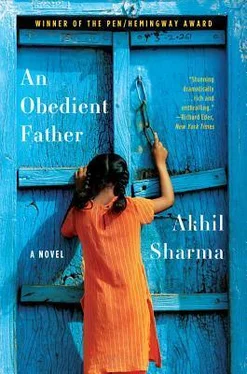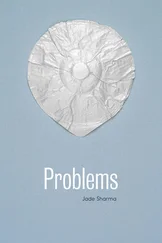Akhil Sharma - An Obedient Father
Здесь есть возможность читать онлайн «Akhil Sharma - An Obedient Father» весь текст электронной книги совершенно бесплатно (целиком полную версию без сокращений). В некоторых случаях можно слушать аудио, скачать через торрент в формате fb2 и присутствует краткое содержание. Год выпуска: 2000, Издательство: W. W. Norton & Company, Жанр: Современная проза, на английском языке. Описание произведения, (предисловие) а так же отзывы посетителей доступны на портале библиотеки ЛибКат.
- Название:An Obedient Father
- Автор:
- Издательство:W. W. Norton & Company
- Жанр:
- Год:2000
- ISBN:нет данных
- Рейтинг книги:4 / 5. Голосов: 1
-
Избранное:Добавить в избранное
- Отзывы:
-
Ваша оценка:
- 80
- 1
- 2
- 3
- 4
- 5
An Obedient Father: краткое содержание, описание и аннотация
Предлагаем к чтению аннотацию, описание, краткое содержание или предисловие (зависит от того, что написал сам автор книги «An Obedient Father»). Если вы не нашли необходимую информацию о книге — напишите в комментариях, мы постараемся отыскать её.
Ram Karan, a corrupt official in New Delhi, lives with his widowed daughter and his little granddaughter. Bumbling, sad, ironic, Ram is also a man corroded by a terrible secret. Taking the reader down into a world of feuding families and politics,
is a work of rare sensibilities that presents a character as formulated, funny, and morally ambiguous as any of Dostoevsky’s antiheroes.
An Obedient Father — читать онлайн бесплатно полную книгу (весь текст) целиком
Ниже представлен текст книги, разбитый по страницам. Система сохранения места последней прочитанной страницы, позволяет с удобством читать онлайн бесплатно книгу «An Obedient Father», без необходимости каждый раз заново искать на чём Вы остановились. Поставьте закладку, и сможете в любой момент перейти на страницу, на которой закончили чтение.
Интервал:
Закладка:
I continued with the Gita on the living-room sofa, unwilling to give up my freedom to be anywhere in the flat.
Nevertheless, when I lay down that night I was happy. Before I fell asleep, I tried to think of innocuous questions I could ask Anita or facts I could chatter about like a beacon pulsing to mark its presence. I had not yet told Anita about Mr. Gupta running for Parliament. That information, if handled well, might last several meals.
Iwas to meet Mr. Gupta at Safdarjung Hospital. He had gone there to talk with doctors who were striking. After meeting with them, Mr. Gupta decided to donate blood. A doctor who met me outside the hospital told me the sight of his own blood had caused Mr. Gupta to faint.
The hallways were empty, and only the patients who could not be moved were in the hospital. Mr. Gupta was lying on a bed with a wet cloth on his forehead when I arrived. There were two beds in the room. The other one held an unshaven man with a three- or four-year-old boy curled against him. A woman in a frayed cotton sari was leaning against a window and looking at the room. Two young doctors in white coats and a reporter with a camera around his neck stood between the beds.
"We feel bad to be on strike," one doctor was telling Mr. Gupta. "That's why we are all giving blood. But look at this room." The floor had dark mop marks where someone had pretended to clean. "We have machines costing ten lakhs in the hallway because nobody will buy one part that's broken."
"This is because of corruption," Mr. Gupta said. I went and stood near his head, with the bed between me and the doctors. "They are getting my blood," he told me, and tilted his head toward the half of the room with the man and the child. I wondered whether both the father and the child were sick. "My relatives now." The unshaven man smiled.
"Everything gets eaten," said the other doctor, tall and thin, with hair that reached past his collar.
"The machine you were talking about, what do you need for it?"
"It's for imaging, and the part that actually sees is broken. The part costs seventy thousand."
"Give Mr. Karan here your phone number and he'll get it for you," Mr. Gupta said, lifting his eyes to me. The doctor wrote down his number. Mr. Gupta then said, "Photos done?" to the reporter.
"One with the machine, maybe."
Mr. Gupta and the others went to find the machine.
"What are you sick with?" I asked the unshaven man.
"She's sick," he said, and pointed to the woman. "My wife."
"Did you get the blood as well as the bed?" I asked him, and he started laughing. After a moment the woman did as well. "Who will you give the vote to?" I asked him.
"Him."
"You?" I said to the woman. She smiled and did not answer.
"Her also," the husband said. I did not believe him. "I need a job, sahib. I'm fifth-standard pass and can read and write. I used to drive an autorickshaw, but because of diesel prices had to stop."
I promised to help and gave the man my office phone number instead of the address, hoping he would not want to risk wasting a rupee on the phone call.
Mr. Gupta returned and motioned me to join him in the hallway. "This is Anand," he said, introducing the reporter.
Anand nodded as if agreeing that the correct name had been given. "I can put the blood-donating story in one paper and the machine story in another." We spoke in English in case the people in the room could overhear us.
"I'm paying only if they mention the story on TV," Mr. Gupta warned.
"I can't do TV I told you that before." The reporter looked angry
"Fine."
"I'll write that the part will come in several months, so nobody checks."
"Good."
They were silent for a minute. I had not been sure whether the gift would actually be made.
Anand said, "I forgot my wallet and need to buy lunch."
Mr. Gupta gave him a fifty-rupee note and he left. "The BJP sent him," Mr. Gupta explained after Anand had turned a corner of the hallway. "He writes for four or five newspapers."
He was about to say something else when I spoke. Even though it was too late, I still wanted to discourage him. "The woman who's getting your blood won't vote for you."
Mr. Gupta looked startled and then laughed. "A voting booth curtain is a license to steal. I give them my blood. My blood! They say they'll vote for me, but then the curtain is drawn and they can do anything." When I did not join in the laughter, he said, "The BJP's votes come from people a little more educated than those two." I still did not smile. "We have money, Mr. Karan. And we have no history, so we can promise anything without them being certain we're lying."
"Where will the money come from?"
He did not answer. The woman in the hospital room said something and a boy's voice answered. Mr. Gupta leaned forward and then tilted back. "Whatever happens to me will happen to you." I nodded. "I am being frank."
"I understand."
"How much is the school system worth? If you sold all the land and money we can grant. If you sold everything. The maps on the classroom walls."
"We can't sell everything. We'd get caught." I knew, of course, what Mr. Gupta wanted, but was trying to resist him.
"Not every school. Not everything literally. The schools that have a hundred students." He was now watching me intently. I wondered what Mr. Bajwa would do in my place. "Some of the small schools sit on good land." Mr. Gupta waited, as if for me to catch up. "How much would people pay? What amount?"
"How many people have connections enough that they can risk buying schools?"
"You tell me." I didn't answer. "If I win, we can put the paperwork in later, saying the property was not useful as a school," he said. "If I don't win, the buyer either loses what he has paid or pays other people."
I did not want to offend him any further, so I said, "I understand."
"How much would we get if we sold the school on the Hill?"
The few property developers I knew I did not know well. "I'll find out who has the most contacts."
Seeing I had nothing more to add, Mr. Gupta said, "We have the BJP's support if we don't embarrass them. People think Rajesh Khanna still looks like he did in the movies." Mr. Gupta stopped and appeared to check my response. I shook my head no. "They see him fat and bald now, they'll feel cheated and vote for someone else."
Six or seven schools and stretches of property were out of the way enough that they could be sold without the newspapers discovering what had happened.
Mr. Gaur ran a small school at the base of the Hill. The school was two long yellow rooms in a dirt compound. He and his wife were the only teachers there. It had started out as an experimental year-round school to teach street children basic skills. Instead of regular classes there were supposed to be short repeating units of math, literacy, and government that children could drop in and out of When Mr. Gaur took over the school, he converted the rooms into a home for his family. Classes were held outside. In the winter, students were discouraged from coming; those who did were accommodated in one of the rooms. The wall behind the school had separated the compound from the brambles and dirt paths of the Hill until four or five years ago, when it collapsed. Bushes now came within a few feet of the school windows.
The Hill, the largest park in Old Delhi, abuts several rich neighborhoods, and I had no doubt the school would sell. I thought Mr. Gaur would agree to the sale because he and his wife were near
retirement, his daughters had married, and his son worked outside Delhi. The difficulty was to get Mr. and Mrs. Gaur out without panicking them that the Congress Party would punish them for taking part in the funding of the BJP.
Thirty or so students, from about eight to fourteen or fifteen, were sitting in two clumps under a mango tree in the center of the courtyard. One clump was chanting the alphabet, which was written on a blackboard, and the other was having subtraction explained by Mrs. Gaur. They appeared to be trying to shout each other down. Mrs. Gaur was a tiny woman with a flat face that appeared pressed in. She had a blackboard behind her and was showing how numbers are carried over. The sums were faded, and instead of marking them with chalk as she explained, she only pointed at the figures. I realized she did not write new problems every day.
Читать дальшеИнтервал:
Закладка:
Похожие книги на «An Obedient Father»
Представляем Вашему вниманию похожие книги на «An Obedient Father» списком для выбора. Мы отобрали схожую по названию и смыслу литературу в надежде предоставить читателям больше вариантов отыскать новые, интересные, ещё непрочитанные произведения.
Обсуждение, отзывы о книге «An Obedient Father» и просто собственные мнения читателей. Оставьте ваши комментарии, напишите, что Вы думаете о произведении, его смысле или главных героях. Укажите что конкретно понравилось, а что нет, и почему Вы так считаете.












